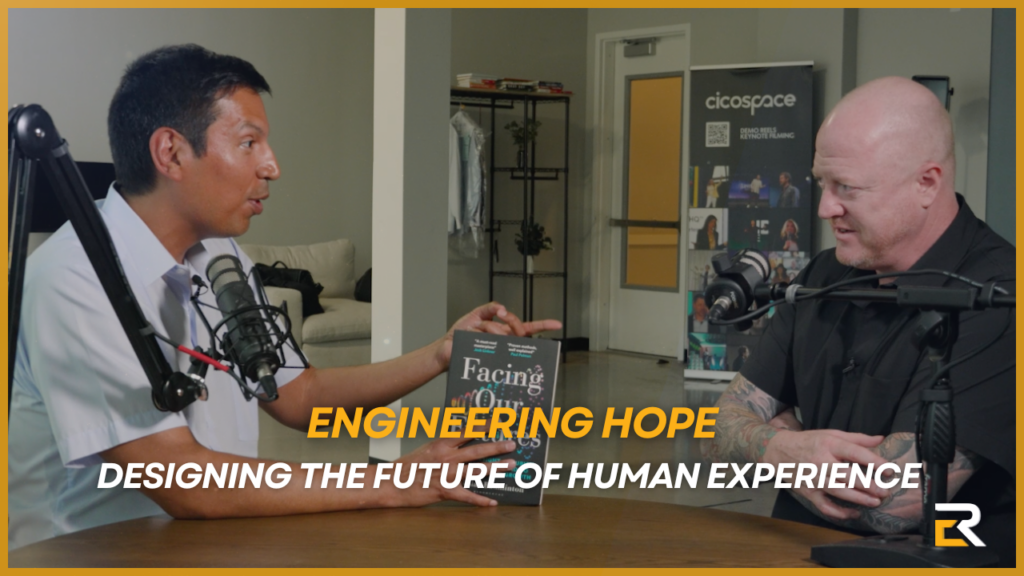
“You either choose to be part of the future, or you’re a passenger on someone else’s.”
That line from futurist and bestselling author Nikolas Badminton isn’t just memorable. It’s a challenge. And it perfectly captured the urgency of our conversation on The Future of Human Experience podcast.
In a world shaped by AI, automation, and rapid disruption, we need more than quarterly strategies and surface-level innovation. We need vision, courage, and the ability to put people, not just technology, at the center of everything we build.
Human-Centered Innovation: Beyond the Buzzword
Nik’s story doesn’t begin in a university foresight program. It starts in applied psychology, artificial intelligence, and global tech strategy. That background makes his view of the future both grounded and essential.
He reminded me that the most powerful innovations often disappear into the background.
Social media. Solar panels. Self-driving Waymo in Scottsdale.
It’s not the tools that transform us. They shape how we imagine, connect, and create meaning.
After riding in a Waymo, Nik’s son spent the afternoon pretending to be one. That story stayed with me, not because of the technology, but because of the curiosity it sparked. Futures thinking begins not in labs, but in play, in exploration, and in asking, “What if?”
That’s a question every leader should be asking right now.
Purposeful Leadership: Vision Over Reaction
One of the most striking parts of our conversation was Nik’s insistence on long-term thinking, even for small startups and nonprofits.
“Without a 20-year vision,” he said, “you’re going nowhere.”
It’s a truth we don’t hear often enough.
Too many organizations are trapped in the situation’s urgency. While that’s understandable, it’s also dangerous. When you don’t define your direction, you risk becoming a passenger on someone else’s path.
Purposeful leadership requires more than agility. It demands aspiration.
Yes, it’s hard to think 20, 50, or even 300 years ahead when your team is stretched thin or your community has urgent needs. However, leadership is not about having all the answers. It’s about having the courage to define and move toward a direction.
As Nik shared, organizations that make that leap, from reaction to vision, grow stronger, more inclusive, and more resilient.
Meaningful Change: When Technology Serves Humanity
Nik and I explored the energy transition, especially in the sun-drenched Southwest.
Fifteen years ago, I believed Phoenix would become an energy utopia. Today, that dream feels delayed. The technology is ready, but belief, policy, and infrastructure have not kept up.
“Humans don’t want to manage infrastructure,” Nik observed. “That’s why progress often comes gradually, then suddenly.”
Whether talking about solar, AI, or the workplace, change does not happen just because the tools exist. It happens when leaders commit to long-term investment and build systems designed for people rather than just performance.
That’s what separates innovation from transformation.
Redefining Leadership: Love, Curiosity, and the Future of Work
One of the most surprising moments in our conversation came when Nik described leadership as an act of love.
He wasn’t talking about the performative “we’re all family here” sentiment. He was referring to the real, courageous act of caring deeply about people’s growth, well-being, and sense of purpose.
He recalled giving a keynote to a room full of engineers and CEOs — people not often known for emotional language — and telling them,
“Your work is about love.”
It shifted the room.
And maybe that’s what the future of leadership will require: not just better KPIs but deeper empathy, not just engagement surveys but genuine belonging, not just innovation sprints but the space to wonder, “What if we did it differently?”
The Call Forward
This conversation reminded me that futurism is not about prediction. It is about participation.
We don’t inherit the future.
We imagine it.
We build it.
Or we miss it entirely.
Whether leading a company, a classroom, or your household, you are already shaping what comes next — either by design or by default.
Reflection Question
What is one practice in your organization that has never been questioned and is accepted as “the way it’s always been done”?
What would happen if you paused and asked, “What if we did it differently?”
That question might unlock your next major innovation or your next act of meaningful leadership.
If this conversation sparked something in you, I invite you to:
Subscribe to my newsletter here.
Listen to the full episode with Nikolas Badminton on The Future of Human Experience.
Share it with someone who is also building toward a better future
Take 10 minutes today and ask a colleague: What kind of future are we building together?
This isn’t just a podcast. It’s a blueprint for leading with vision, imagination, and humanity.